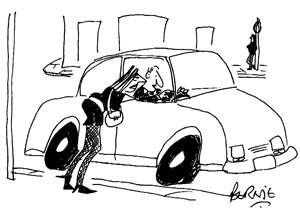Next weekend is the 40th anniversary of Harold Wilson slashing sterling’s official value from $2.80 to $2.40 and telling us the pound in our pocket had not been devalued. It was a disaster, Wilson later confessed in his memoirs: a national shame that interrupted the Swinging Sixties. And now the pound has risen above $2 to its highest level for more than quarter of a century and we rejoice at sterling’s strength, gloating over the dollar’s misfortunes.
That $2 is ‘high’ when Wilson devalued the pound to a then record low of $2.40 shows not only that today’s rate is a blip in a long-term slide from the pre-war rate of above $5; it reflects Britain’s perpetually confused attitude to exchange rates. Perhaps because our only direct experience of currency rates is converting holiday cash or planning New York shopping sprees, we regard a strong pound as good and a slide in sterling as bad.
It is a premise that infects politicians of all parties. Labour’s 1949 devaluation from $4.03 was seen as a cruel blow to a nation that had won the war; as in 1967, the banks and stock exchange were closed by royal proclamation to provide a day of mourning. Black Wednesday in 1992 is still regarded as Britain’s recent economic nadir and the politicians’ language does not change: John Major and Norman Lamont echoed Wilson in talking of political disaster. Devaluation was ‘an easy way out’, said Wilson; ‘a soft option’, said Major.
Indeed, the whole ritual hardly changes. After the denial (Sir Stafford Cripps said nine times he would not devalue before doing so) comes the run on sterling, with billions spent on futile defence; then sombre ministerial broadcasts and Draconian measures are followed quickly by the Chancellor’s departure.
Wilson was fighting a losing battle to keep sterling at a fixed rate, of course. Those were the days when the UK economy revolved around the balance of payments — before money supply and inflation assumed that position — and every adverse trade figure caused sterling to lurch. The difficulty of holding the pound within narrow limits simply highlighted the Treasury’s lack of control over the economy. The Heath government eventually gave up the struggle in 1972 after throwing yet more money at the market, allowing the pound to sink to its natural level. Four years later, despite an IMF rescue, it sank through $2, eventually to bottom at $1.03 under Nigel Lawson’s stewardship.
Floating the pound turned devaluation from a setpiece event once every second decade into a daily occurrence, but the sense of shame continued. It was seen as part of the problem rather than the solution, just as today’s strong pound is regarded as a measure of Britain’s might. But the point of cutting the currency’s conversion rate is to make exports cheaper, deter imports to promote domestic industry, and allow lower interest rates (though all UK devaluations have been accompanied by short-term rate rises — doubly so on Black Wednesday).
The Americans are not ‘suffering’ from a weak dollar, therefore: it is providing a much-needed boost to their economy and allowing dollar interest rates to fall. After each of Britain’s devaluations the economy has boomed and we are still benefiting from the new start that Major and Lamont did their utmost to resist in September 1992. The boost 40 years ago almost won Wilson the 1970 general election.
Today’s high pound, conversely, means the UK has the highest interest rates in the industrialised world, an inflow of cheap imports and manufacturers struggling to export. When Wilson devalued, the country depended on selling goods abroad; now, ironically, Britain’s main overseas trade is the invisible exports of the investment banks responsible for causing the pound to plunge or soar.
But the truth is, the pound is not strong — it is the dollar that is weak and a weak currency results from a weak economy. And sterling is the fulcrum of a seesaw, higher at the moment than the dollar end of the structure but lower than the euro at the other end. Britain mocked the single currency when it slumped after its launch, but it was the eurozone that gained at the expense of Britain’s exporters — and the single currency means mainland Europe no longer worries about devaluation.
The weak dollar may be the solution, but the faltering US economy is the problem, and that is the real reason for national shame and political embarrassment. But because devaluation is seen as a remedy akin to bankruptcy, in Britain it attracts Dickensian opprobrium.
However, if governments did not devalue, markets would. Indeed, it is markets that have forced the reluctant hands of governments every time, from Attlee and Wilson to Heath and Major. November 1967 was just another lesson in the futility of trying to buck the markets. Never mind the pressure on the UK economy now: celebrate the $2 pound and book your pre-Christmas tickets to New York to see for yourself why the dollar is weak.





Comments